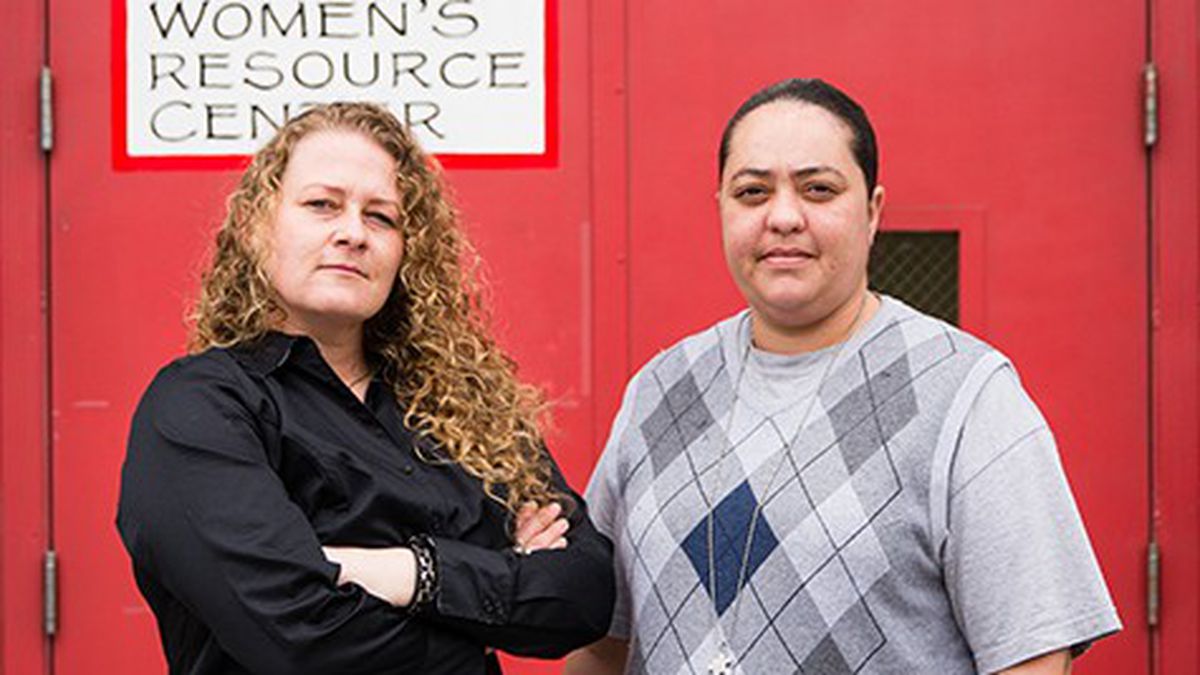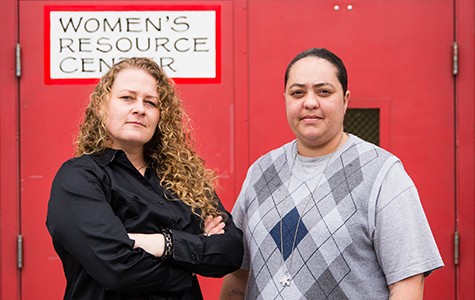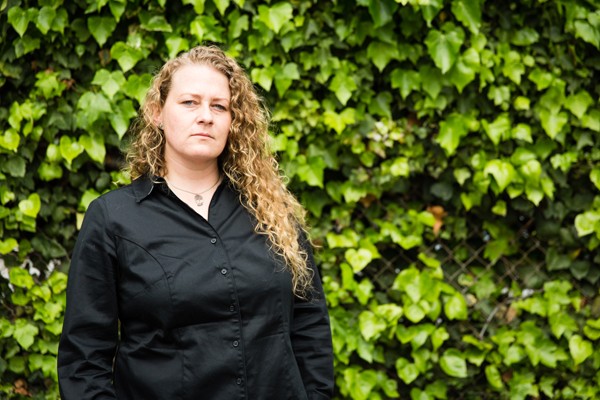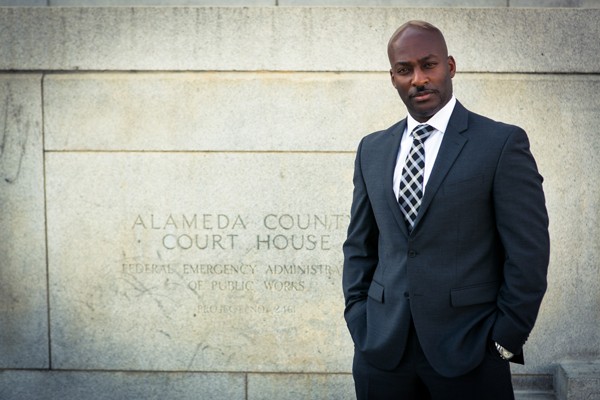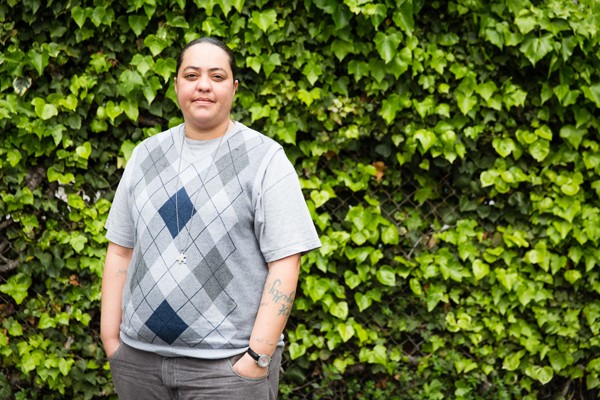When Chloe Turner was in state prison, her family sent her money on a few occasions. It wasn’t much, but it was more than her fellow inmates — many of who were serving life sentences — received, since they often went years without getting any mail at all. So she was grateful for the contact. And even a tiny amount of cash helped.
“It’s really hard because you’re put in a position where the only freedom you really have is once a month you can do some shopping,” explained Turner, a 35-year-old East Bay resident who spent most of her twenties in and out of jail and prison for various drug-related offenses.


Credits: Stephen Loewinsohn 
Chloe Turner said her state restitution fines are holding her back. Credits: Stephen Loewinsohn 
De’Mario Lewis said he thought seriously about selling drugs to pay off his restitution. Credits: Stephen Loewinsohn 
Alameda County Public Defender Brendon Woods said restitution fines are too burdensome. Credits: Stephen Loewinsohn 
Restitution debt collectors seized $4,000 from Teeoni Newsom’s bank account. Credits: Stephen Loewinsohn 
Turner and Newsom are close friends. Credits: Stephen Loewinsohn 
In prison, “shopping” means purchasing basic necessities from the commissary, such as soap, deodorant, and snacks. And without financial support from loved ones, most inmates are forced to rely on low-paying prison jobs to make money. Turner cleaned toilets. She also briefly worked in the kitchen, but spent a majority of her time doing janitorial jobs — mopping floors, picking up trash, and cleaning bathrooms. She made roughly seventeen cents an hour. California state prisoners can earn a maximum of 37 cents an hour.
With these kinds of measly wages, many inmates just don’t have enough money to buy the basic items they need. Moreover, much of the money they earn or receive from family members is confiscated by the California Department of Corrections and Rehabilitation. The department automatically seizes half of the income that most inmates earn, as well as half of the money deposited into their prison bank accounts by family members. The state collects this money to pay off an inmate’s restitution fines, which are the financial penalties that all people convicted of crimes in the state are ordered to pay upon sentencing. It is the criminal offender’s so-called “debt to society,” a punishment in addition to being sent to prison or jail or put on probation.
Along with exacerbating the financial hardships placed on inmates, the confiscation of a family member’s gift can be emotionally upsetting, given the symbolic value this support can carry. “Your money is being taken and you’re not able to buy the stuff you need — you are completely helpless,” said Turner, noting that she eventually told her family to stop sending cash altogether.
And when Turner was released from prison in 2008, the burden of restitution was far from over. Her debts from a series of convictions added up and quickly became insurmountable, dragging her down as she struggled to turn her life around and move beyond her criminal past. Six years later, she still owes more than $10,000 in unpaid restitution fines and is unsure when she will ever be able to pay it off. Turner has a full-time job, helping women reenter society after prison as a program coordinator with Community Works West, a nonprofit affiliated with the Women’s Resource Center at the San Francisco Sheriff’s Department. But even though she has a job, it doesn’t pay well enough for her to live in the pricey Bay Area and make a significant dent in her debt at the same time. “I can’t get my life together because I owe all this money,” she said. “I’m just trying to live.”
In California, restitution fines support the Victim Compensation program, a state fund that provides financial aid to many victims of violent crime, helping them with a wide range of expenses, such as medical bills, mental health services, and crime scene cleanup. The program has faced a backlash over the last year because it denies certain victims the right to collect compensation. Until recently, sex workers were barred from accessing financial support if they were involved in prostitution leading up to an act of violence. After activists protested this regulation, the board overseeing the program voted to scrap it. But the decision has sparked debate about other categories of people still excluded from the program — notably formerly incarcerated people on felony parole and probation and victims who refuse to cooperate with police. (For more, see “Unfair Punishment Part One: Victim Discrimination” published last week.)
But the institutionalized discrimination against certain victims is not the only reason that prisoners’ rights advocates contend that California’s Victim Compensation program is broken. Activists also lament the fact that the program, on a fundamental level, is funded on the backs of low-income people trying to rehabilitate their lives after incarceration. The money for victims supported by the program does not come from taxpayers, but rather from all adults convicted of felonies and misdemeanors in California, including people who commit drug crimes and other nonviolent, victimless offenses.
“The whole way in which the fund is set up puts the burden on a group of people … that really have no money and are sucked into a debtor situation,” said Diana Block, a founding member of the California Coalition for Women Prisoners.
Critics further argue that, from a financial standpoint, there’s no reason the fines levied on people convicted of crimes in California have to be so steep in the first place. In fiscal year 2012-13, state officials reported a restitution fund “reserve” of nearly $80 million.
In addition, there’s evidence that the financial penalties levied by judges are simply too large for most people to afford. Data from the Department of Corrections shows that most people sentenced to state prison have been unable to pay off their restitution debts.
As is the case with Turner, the financial burdens of restitution can stay with people for years, creating yet another barrier to rehabilitation post-incarceration — one that can make it hard to secure a job, go back to school, or even keep up with rent. In this way, the state traps people in poverty, shackling them to the prison system after they’ve left it.
Ruben Leal knows firsthand how the state’s Victim Compensation system can intensify the suffering of those already in pain. After Leal was shot in a drive-by incident in 2010, the state refused to offer him any aid due to his alleged failure to cooperate with police (a story told in part one of this two-part series). The 25-year-old East Oakland resident is also intimately familiar with the burden that the state’s restitution system can place on families trying to help their loved ones behind bars. Leal’s brother has been in prison since 2004, and every time his mother sends his brother money, the department takes its 50 percent cut.
“All these people, mostly from low-income families, are paying into this fund — and they’re the same people that don’t qualify [to receive victim compensation],” said Leal, who works as an outreach coordinator with Communities United for Restorative Youth Justice, a local nonprofit. “People think that money is coming from taxpayers, which it’s not. Folks are paying into that fund with restitution. I feel like the whole system is flawed.” Even as the state seizes half the money his mother sends him, Leal’s brother will very likely have large unpaid debts upon his release.
In addition to the misconception that Victim Compensation is a taxpayer-supported program, the role of restitution in the California criminal justice system is also widely misunderstood. While some assume that restitution simply means offenders paying victims for specific damages, in reality, it’s more complex.
There are two main forms of restitution in the state: One is the “direct order” that offenders must pay to a victim. This is a financial penalty that a person convicted of a crime must pay directly to the victim to repay the losses he or she suffered. The other type is the restitution “fine” — the offender’s mandatory “debt to society.” Judges order these fines at sentencing for every misdemeanor and felony offense, and these payments go to the state, making up the majority of revenue of the “Restitution Fund.”
It is from this pool of money, which has generally remained static in recent years, that the state compensates victims of violence — beyond what they receive directly from the person convicted of the crime. The Victim Compensation program also gets some federal dollars from restitution fines paid by people convicted in federal court. Governor Jerry Brown’s fiscal year 2013-14 budget calls for Victim Compensation to spend $75 million of the fund on victims, but there is no cap, meaning victims are never rejected due to the financial limits of the fund. Since the program was first established in 1965, the state has provided victims with more than $2.2 billion in aid.
“These are rights at a constitutional level, which means they are no less important than a defendant’s right to counsel,” said Ken Ryken, head of the Alameda County District Attorney’s restitution unit. He was referring to California’s Victim’s Bill of Rights, which first passed in 1982 and was amended in 2008. This amendment to the state constitution outlines a victim’s right to restitution, noting that people who suffer losses as a result of criminal activity have a right to seek and secure restitution from offenders — and that restitution shall be ordered from convicted wrongdoers in every case in which a victim suffers a loss.
When it comes to “direct orders,” there is little dispute that convicted offenders should be held financially responsible for the losses their victims incur as a result of the crime. The additional mandatory restitution fines, however, are controversial.
Ryken said that restitution fines make it possible to help victims with serious and costly needs. If a victim has hundreds of thousands of dollars in medical bills, for example, it’s likely that an offender, who may be serving a long prison sentence, would not be able to cover the expenses. The state can then draw from the Restitution Fund and reimburse the victim in a timely manner, which also ensures that the victim does not have an ongoing debtor relationship with the offender over time. In these scenarios, the offender is then in debt to the state, not the victim. “It’s really a smart idea at the state level,” Ryken said.
In California, the statutory restitution fine amounts have steadily increased in recent years. For misdemeanor fines, the minimum amount a judge can order, as of 2014, is $150, up from $100 in 2011; the maximum is $1,000. For felonies, the minimum fine is now $300, up from $200 in 2011; the maximum is $10,000. These fines are entirely separate from orders offenders may be paying to their victims. Payment of restitution fees is mandatory; the debt cannot be eliminated through bankruptcy.
“When I look at the victim restitution fund, what I see is a hostage relationship,” said Dorsey Nunn, executive director of Legal Services for Prisoners with Children, a San Francisco-based nonprofit. “We’re taxing the family members of incarcerated people by seizing money that they send their loved one …. They’re demanding ransom.”
Nunn said he never spent the ten dollars his daughter sent him while he was incarcerated, because it meant so much to him on a personal level. And having the state take half of a family member’s gift is incredibly painful for any prisoner, he said. Advocates also noted that losing a significant cut of already-paltry prison wages can be very frustrating. According to the Department of Corrections, wages for low-level jobs can pay as little as eight cents per hour. After the restitution payment, that’s four pennies.
“People don’t understand how much people have to pay for their own upkeep and survival in prison,” said Block, of the Coalition for Women Prisoners, citing the need to purchase basic toiletry items. “All the things that help you make it through, you have to pay for them. They are not given to you. And the only way you can pay for them is whatever small amount of money you can make … or if you have families or friends who want to help support you.”
In a way, these criticisms bolster one of the policy arguments in favor of the restitution system, supporters say. Ryken pointed to case law that advocates for the ordering of full restitution in every case, regardless of the offender’s ability to pay. “It’s something the state wants the defendant to bear fully to appreciate the weight of their conduct and the full extent of their conduct,” he said. Restitution fines, he added, support “rehabilitation of the offender, making them fully responsible for their conduct, and deterring future misconduct. If the penalty or burden is large enough, it will cause the defendant from recidivating — from doing it again.”
But for some people with criminal records, restitution can have the opposite effect.
One day in the summer of 2011, De’Mario Lewis almost gave up. The 24-year-old West Oakland resident was trying to provide for his son, who was then six months old, but he could not find any work. At the time, Lewis had an unpaid restitution fine from a recent misdemeanor case. With the lingering debt, he could not clear his legal record, a fact that prevented him from getting a job. And without a job, he couldn’t pay off what he owed.
“What do we do? How do we make some money? Do we sit up here with a change cup?” Lewis said. “Or shit, do we hire ourselves and buy a bundle of crack cocaine and go sell it? That’d be the easiest route.”
Lewis remembered the day that he seriously considered making money selling drugs. At that very moment, he said, his baby boy stared up at him and poked his face with his tiny hand, temporarily blinding him. “He grabbed me between my eyes with his two fingers,” he said. “I looked at him, but I couldn’t see him.”
It was a powerful sign, he continued. “God showed me that if I go out there and do that, I’ll never see my son again. That was my breaking point.”
Inspired by his son, Lewis chose not to sell drugs. But his internal battle underscores the contradictions of the restitution system. While some argue that these financial punishments are designed to discourage people from reoffending, in practice, they can make it very challenging for debtors to stay out of trouble. Lewis’ struggle also highlights the way restitution can punish people who commit relatively minor crimes.
He was charged with illegal possession of a firearm in September 2009. After fighting the charge for months, in February of 2010, he was ordered to spend 45 days in county jail. When he was released, he had nearly $800 to pay off in restitution.
“I was just so furious because I was like, ‘I really want to get my life back right,'” said Lewis. “I had this restitution hanging over my neck. It’s bullshit. It’s unfair.”
This catch-22 is just one of many ways in which fines can become obstacles after incarceration, drowning people in debt and trapping them in poverty.
When he was released from custody, Lewis initially started paying $50 a month, but even those small payments proved challenging. With an unpaid restitution debt, he couldn’t clear his criminal record, and thus was not eligible to get the license he needed to get a job as a security guard. Meanwhile, he was trying to prepare for the birth of his first child, who was born in January 2011. He eventually landed a temporary, part-time job with Oakland Rising, a local nonprofit, but still could not pay off his debts for months.
“I can work towards something better in my life, but when you have certain limitations on you, you have to settle for less,” he said.
As he started raising his son, Lewis stopped paying restitution regularly. At the same time, he managed to stay out of trouble. Last fall, he finally received some good news — he was offered a job as a teaching assistant. But he would not be able to start until he cleared his criminal record, which meant he had to pay his restitution in full. So with support from local advocacy groups United Roots Oakland, Urban Peace Movement, and Urban Strategies Council, Lewis finally paid off his restitution debt in December 2013. He’s in the process of getting his record cleared and hopes to start teaching full-time soon. In the meantime, he has been working part-time as a ticket-taker at the Coliseum. “I’m back to being normal again,” he said.
But Lewis still struggles to understand why the system sets people up for failure. “People make mistakes … but they do want to change their lives,” he said, adding, “if you’re paying restitution, I feel like you should be paying restitution to a victim … people who got robbed or brutally beat up. That’s what restitution is for.”
While restitution made it difficult for Lewis to get a job, it can have more severe consequences for people convicted of serious crimes.
“Absolutely, victims have a right to restitution to be made whole,” said Alameda County Public Defender Brendon Woods. “The flipside is that one mistake by your client can essentially ruin their lives, and when you have those clients who have taken every step to get back on the right track — they’ve completed probation, they’ve stayed out of trouble, they’ve done what they’re supposed to do — and they have this huge financial obligation, it makes it very hard for them to move forward.”
At the state level, parole agents and officials with the Victim Compensation program refer formerly incarcerated people with unpaid restitution debts to the state Franchise Tax Board, which assumes responsibility for collection. The mechanisms are different for each county, but often involve private collection agencies that go after those in debt. These entities function in a similar manner to credit card companies in pursuit of debtors. “Like any commercial practice, their compensation depends on how successful they are, so they may be fairly aggressive,” said Ryken of the Alameda County District Attorney’s Office. (Alameda County does not contract with private companies for this service and is one of two counties in California with a dedicated restitution court that oversees the collection process.)
Debt collectors may intercept income tax refunds, withhold wages from paychecks, and even take money directly from an individual’s bank account. In some cases, fees and premiums may add to a person’s debt. The state can also place a lien on inheritances. Meanwhile, debt can severely damage an individual’s credit, prevent people from getting a driver’s license, and block an otherwise eligible person from clearing his or her record of misdemeanor convictions.
For some people with criminal records, the combined impact of these consequences can make it impossible to live a normal life — even years after incarceration.
The amount of time it takes criminal offenders to pay their restitution fees varies tremendously and cannot be tracked, according to Anne Gordon, a spokesperson for the Victim Compensation and Government Claims Board. It can range from a few months to years, she said.
Data on the amount of fines ordered versus the amount of fines collected, however, sheds some light on people’s inability to pay. In California, from 1992 to 2013, judges levied $812 million in restitution fines against criminal defendants who were sent to state prison, according to statistics provided by Dana Simas, spokesperson for the California Department of Corrections and Rehabilitation. During that same time period, the state collected only about $190 million, or 23 percent of the total. And the collection rate for restitution direct orders, which are supposed to be paid by criminal offenders directly to their victims, was even lower for people who were sentenced to state prison: Of the more than $3 billion fines levied during that period, the state has collected the equivalent of about 2 percent.
Teeoni and Keyuna Newsom have learned the hard way how the restitution system traps people in debt. The two women met about five years ago shortly after they were both released from state prison, and they have been partners ever since. They got married last July and now live in Richmond where they’re raising their twelve-year-old daughter. Teeoni, 36, works full-time as the young men’s case manager at Community Works West, the nonprofit organization affiliated with the San Francisco Sheriff’s Department. Keyuna, 33, works as a part-time administrative assistant for Resolve to Stop the Violence, a program of Community Works.
Teeoni said she was once a gang member in Southern California and spent roughly seventeen years behind bars for a range of crimes, including robbery, carjacking, assault, and more. Teeoni has “two strikes” on her record under California’s Three Strikes Law, meaning she could get a life sentence if she were convicted of another serious felony. Keyuna spent about two years in prison for possession and grand theft in a case that she said involved an undercover cop (and thus no actual victim). Through a series of programs and job opportunities, the two have turned themselves around and are now focused on rebuilding their lives together and raising a family. By all measures, their criminal histories are behind them — except for their restitution fines.
When Teeoni was first released in 2009, she had an initial debt of roughly $3,000, which the state began collecting by taking a 10-percent cut from every paycheck. Then one day in 2010, collectors confiscated roughly $4,000 directly from the joint bank account she shares with Keyuna, who also had thousand of dollars to pay off. At the time, they weren’t even sure whose unpaid fines led to the sweep. But their account was wiped clean — seemingly out of nowhere.
“They took all of it, like every single bit that was in the bank account,” recalled Teeoni, noting that they only realized what had happened when their checks started bouncing. “What is the point of me having a job if you’re going to take all of my money?”
“I was devastated,” added Keyuna. “We had a nice chunk of change saved up … and they took everything.”
And it didn’t end there. In January of this year, Teeoni had $316 more taken out of her paycheck, and learned that debt collectors intend to start taking a whopping 25 percent of her income. These deductions apparently will continue until she pays off a $2,000 debt, separate from the fines she first paid upon her release.
Teeoni said the lost income is already a significant strain on her family. “I can’t not feed everybody,” she said. “I could lose my house. I could lose my car. Am I going to lose everything that I’ve been working for all this time? Because I came out here to change everything and it’s like, as soon as I changed, you decided, ‘you know what? Here, pay this.'”
Teeoni said she understands the importance of taking responsibility for her past actions, but noted that she has served her time and has already paid thousands of dollars. The lingering fines seem meaningless and unbeatable to her. “Should I just quit my job and go back to what I was doing and then they can’t find me?”
Teeoni said she would never break the law again, but noted that, as a case manager, she regularly sees clients who, in the face of unpaid fines, start selling drugs or disappear altogether.
One woman with large restitution fines, who requested anonymity in order to protect her future job prospects, recalled through tears a time when she had to choose between paying for her cap and gown for her post-graduate ceremony at UC Berkeley and paying her next restitution fee. Another woman, a San Francisco mother of four, also requested anonymity due to the fact that she has temporarily stopped paying restitution because she can’t afford it. She said that after she was released from jail, she couldn’t purchase furniture for her children’s bedroom because of steep fines she owed. Her difficult financial situation is preventing her from moving out of a bad neighborhood, and she can’t find any full-time work while she has unpaid debts.
These challenges are common for low-income people saddled with hefty fines, said Woods, the public defender. “In the bigger scheme of things, it’s such a low priority, because they’re worried about housing and food … getting their kids to school,” he said of restitution fines. “If you have addiction issues, you’re just worried about staying off the rock. There are so many other bigger issues that they are dealing with than the restitution fund fine.”
Critics argue that California could clearly reduce these restitution burdens without bankrupting its financial aid program for victims. The budget for fiscal year 2014-15 includes a nearly $62 million restitution fund “balance” or “reserve for economic uncertainties.”
Jon Myers, deputy executive officer of public affairs and outreach for the Victim Compensation and Government Claims Board, argued that the program overall does not have cash to spare and has generally been spending more than it takes in each year. In 2012-13, the fund spent roughly $112 million while it collected roughly $108 million, the majority of which came from fines. The roughly $4.4 million difference illustrates the program’s “structural imbalance,” Myers said. “The fund is not completely secure,” he said, noting that state officials recently reduced payment rates for certain expenses for victims to help ensure the solvency of the program’s finances.
“I work with victims every day. I hear stories about a mother who lost a child and has to pay for a funeral she can’t afford,” he said. “What’s the cost of the casket that a mother has to pay? A domestic violence victim that has to go out and find a new home?”
His sympathy, he added, always falls to victims in debt, not criminal offenders.
For roughly three years, Chloe Turner worked two jobs seven days a week, while going to school full-time. It was exhausting, but necessary, she said, given that her unpaid restitution fines prevented her from accessing certain student loans. Still, she completed an entrepreneurship-training program at Stanford Law School as well as a post-prison health worker certificate program at City College of San Francisco. And last year, she graduated from the University of San Francisco with a bachelor’s degree in organizational behavior and leadership. Her plan is to eventually go to law school — a dream she likely have to put on hold until she pays off all of her restitution.
The Newsoms, who are close friends of Turner, will also likely have difficulty achieving their long-term goals while they are still in debt. They said they want to someday start their own youth program to offer an alternative to gangs. But that would require a level of financial stability, which, at this point, seems unattainable, said Teeoni. “I don’t have money to save anymore. … And if I put money in the bank to try and save up, they are going to take it away from me.”
Turner is eager to advance her education and career partly because she wants to someday work as a public defender. “I really want to make a difference with the clients I work with,” she said. “I could advocate for them on a different level. I know where they come from. That would give me an advantage.”
But with outstanding restitution debts, Teeoni is unable to access many of the student loans she would need for law school. She also can’t get a Certificate of Rehabilitation, an official document that is required for admission to law school and one that could significantly boost her future job prospects.
This is despite the fact that she has, by every other measure, rehabilitated her life.


